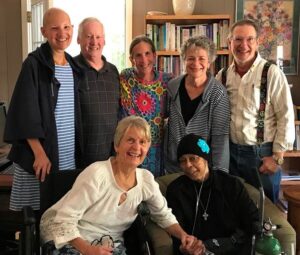 We all are mortal, a fact often hidden away in a closet in the back of our minds. Seldom do we confront the significance of our own mortality, or the mortality of those closest to us. Even more rarely do we engage our loved ones or friends in a conversation about the impermanence of life. Mortality is not a topic that leaps to mind when we meet and greet friends or strangers each day. It is little wonder that we are caught off-guard when our physician turns and informs us, for the first time, that cancer or some other threatening condition will be a part of our future life experience.
We all are mortal, a fact often hidden away in a closet in the back of our minds. Seldom do we confront the significance of our own mortality, or the mortality of those closest to us. Even more rarely do we engage our loved ones or friends in a conversation about the impermanence of life. Mortality is not a topic that leaps to mind when we meet and greet friends or strangers each day. It is little wonder that we are caught off-guard when our physician turns and informs us, for the first time, that cancer or some other threatening condition will be a part of our future life experience.
A little over a year ago, this long-ignored reality knocked on my door. I was diagnosed with stage III colon cancer. The shock was palpable. I was frightened, insecure, and vulnerable. How was I to embrace an uncertain future and the inevitable “end of being”? A special friend introduced me to Dr. Elise Lark. After we had chatted but a brief time, Elise encouraged me to join a support and discussion group, Explorations on Being Mortal. Although I had never thought of myself as a support-group type, I said I would give it a try.
The following week I set off with apprehensions and misgivings. “Why was I going to meet strangers to talk about being mortal?” I asked myself. I arrived and stole quietly into the Cancer Support House where I was struck immediately by the warm and open living room area. I was directed through to the library, where several chairs were arranged in a comfortable circle. “Well, at least it is not a sterile classroom or conference room,” I thought to myself. After nodding to the strangers already assembled, I selected a seat slightly back and a little separate from the group. Elise introduced us to Dr. Rosanne Fox, who would help facilitate our group.
The conversation began with a quick summary of each participant’s diagnosis, therapy, or recent tests. Some spoke of their fears of test results or frustration with therapy side effects. Immediately, I was struck by everyone’s authenticity. Each listened raptly, one to another, and each provided the support of genuine understanding and compassion. It wasn’t long before I noticed I had moved my chair forward and “joined” the group. But this was much more than a group: this was a family intimately connected by the self-awareness of being mortal. Here were open and inviting connections of friendship, love, compassion, and unquestioning acceptance.
As the session ended, I noticed each face had morphed from stranger, to acquaintance, to friend, all within the space of little more than an hour. I knew I would be back. Since that first meeting, we have laughed and cried and experienced triumphs and grief together, as we encouraged each other every step along the way. But most of all, we have come to share an intensity of affection, informed by the wisdom of our own mortality. This, I am learning, is what being mortal is really all about.
Jim Gohlke graciously bequeathed his home in the historic Rondout District to CFD to become the first comfort care home for the dying in the Mid-Hudson Valley. He died shortly afterwards.